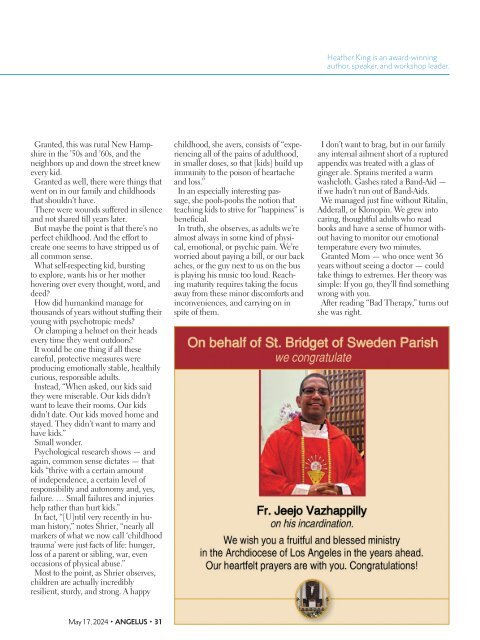Angelus News | May 17, 2024 | Vol. 9 No. 10
On the cover: Emma D. and Roberto M. read during a class session at San Miguel School in Watts, one of 24 schools in lower-income areas across the Archdiocese of Los Angeles participating in the new Solidarity Schools initiative. On Page 10, Theresa Cisneros examines the program’s ambitious goals and talks to participants who describe its early success in creating a ‘culture of literacy’ among disadvantaged students.
On the cover: Emma D. and Roberto M. read during a class session at San Miguel School in Watts, one of 24 schools in lower-income areas across the Archdiocese of Los Angeles participating in the new Solidarity Schools initiative. On Page 10, Theresa Cisneros examines the program’s ambitious goals and talks to participants who describe its early success in creating a ‘culture of literacy’ among disadvantaged students.
Create successful ePaper yourself
Turn your PDF publications into a flip-book with our unique Google optimized e-Paper software.
Heather King is an award-winning<br />
author, speaker, and workshop leader.<br />
Granted, this was rural New Hampshire<br />
in the ’50s and ’60s, and the<br />
neighbors up and down the street knew<br />
every kid.<br />
Granted as well, there were things that<br />
went on in our family and childhoods<br />
that shouldn’t have.<br />
There were wounds suffered in silence<br />
and not shared till years later.<br />
But maybe the point is that there’s no<br />
perfect childhood. And the effort to<br />
create one seems to have stripped us of<br />
all common sense.<br />
What self-respecting kid, bursting<br />
to explore, wants his or her mother<br />
hovering over every thought, word, and<br />
deed?<br />
How did humankind manage for<br />
thousands of years without stuffing their<br />
young with psychotropic meds?<br />
Or clamping a helmet on their heads<br />
every time they went outdoors?<br />
It would be one thing if all these<br />
careful, protective measures were<br />
producing emotionally stable, healthily<br />
curious, responsible adults.<br />
Instead, “When asked, our kids said<br />
they were miserable. Our kids didn’t<br />
want to leave their rooms. Our kids<br />
didn’t date. Our kids moved home and<br />
stayed. They didn’t want to marry and<br />
have kids.”<br />
Small wonder.<br />
Psychological research shows — and<br />
again, common sense dictates — that<br />
kids “thrive with a certain amount<br />
of independence, a certain level of<br />
responsibility and autonomy and, yes,<br />
failure. … Small failures and injuries<br />
help rather than hurt kids.”<br />
In fact, “[U]ntil very recently in human<br />
history,” notes Shrier, “nearly all<br />
markers of what we now call ‘childhood<br />
trauma’ were just facts of life: hunger,<br />
loss of a parent or sibling, war, even<br />
occasions of physical abuse.”<br />
Most to the point, as Shrier observes,<br />
children are actually incredibly<br />
resilient, sturdy, and strong. A happy<br />
childhood, she avers, consists of “experiencing<br />
all of the pains of adulthood,<br />
in smaller doses, so that [kids] build up<br />
immunity to the poison of heartache<br />
and loss.”<br />
In an especially interesting passage,<br />
she pooh-poohs the notion that<br />
teaching kids to strive for “happiness” is<br />
beneficial.<br />
In truth, she observes, as adults we’re<br />
almost always in some kind of physical,<br />
emotional, or psychic pain. We’re<br />
worried about paying a bill, or our back<br />
aches, or the guy next to us on the bus<br />
is playing his music too loud. Reaching<br />
maturity requires taking the focus<br />
away from these minor discomforts and<br />
inconveniences, and carrying on in<br />
spite of them.<br />
I don’t want to brag, but in our family<br />
any internal ailment short of a ruptured<br />
appendix was treated with a glass of<br />
ginger ale. Sprains merited a warm<br />
washcloth. Gashes rated a Band-Aid —<br />
if we hadn’t run out of Band-Aids.<br />
We managed just fine without Ritalin,<br />
Adderall, or Klonopin. We grew into<br />
caring, thoughtful adults who read<br />
books and have a sense of humor without<br />
having to monitor our emotional<br />
temperature every two minutes.<br />
Granted Mom — who once went 36<br />
years without seeing a doctor — could<br />
take things to extremes. Her theory was<br />
simple: If you go, they’ll find something<br />
wrong with you.<br />
After reading “Bad Therapy,” turns out<br />
she was right.<br />
<strong>May</strong> <strong>17</strong>, <strong>2024</strong> • ANGELUS • 31

















